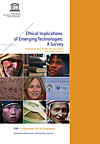UNESCO publishes survey on ethical implications of emerging technologies
The survey entitled “Ethical Implications of Emerging Technologies” has been prepared by Mary Rundle and Chris Conley of the NGO Geneva Net Dialogue at UNESCO’s request.
In presenting results of this examination, the report first tells an introductory story of how the technologies covered relate to one another. Next, infoethics goals are presented. Then, for each technological trend surveyed, the report contains a short chapter drafted in lay terms to provide an overview of the relevant technology and to highlight ramifications and concerns. The report then summarizes this infoethics analysis and revisits the story of the emerging technologies. Finally, the report offers recommendations on ways to advance infoethics goals in anticipation of these oncoming technologies.
Moreover, UNESCO encourages the definition and adoption of best practices and guidelines addressing ethical issues for decision makers, media and information professionals, and all major stakeholders concerned by the issue of Info-Ethics.
It aims at providing an outlook to the ethical implications of future technologies in the area of information and communication as well as at alerting to the increasing power of these emerging technologies and draws attention to their potential to affect the exercise of some basic human rights.
– Read press release
– Download survey (pdf, 436 kb, 89 pages)
(via eGov monitor)





[…] ha pubblicato un’indagine condotta sulle implicazioni etiche della tecnologia emergente, tra cui: il web semantico, le biometrie, il networking pervasivo. L’UNESCO esorta alla […]